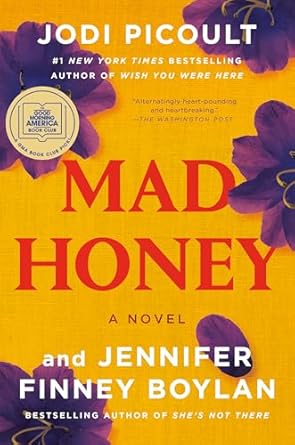3 Stars
This novel has many of the hallmarks of a Jodi Picoult novel: more than one narrator, a focus on family, an exploration of contemporary social issues, and surprise twists and revelations. Unfortunately, as I’ve found with her other books, her desire to educate readers overshadows the need to entertain via a plausible plot.
Eighteen-year-old Asher Fields is charged with the murder of his girlfriend Lily Campanello. The trial reveals that both kept secrets and told lies so even Olivia, Asher’s mother, starts to doubt her son’s innocence.
There are two narrators who appear in alternating chapters. One narrator is Olivia; she narrates in the present tense, moving forward from the day of Lily’s death. The other narrator is Lily; she also narrates in the present tense but her chapters move backwards from the day of her death. Lily’s sections, a type of internal monologue, bothered me. She has a closely guarded secret, but she never reveals what it is – even to herself? Is it necessary to have the first 200 pages, half of the book, hide the main topic? Also, the reverse time of Lily’s chapters means that she vaguely refers to something that happened earlier and then in her next chapter will actually describe what happened; this narrative approach means that there is a lot of repetition. By the time we reach the end of the novel, we already know her story because of what Olivia relates about the trial, so Lily has little new information to add.
There are issues with the courtroom scenes. Olivia details the testimony of others and then testifies herself. Perhaps I’m wrong, but my understanding is that witnesses are usually not allowed to hear other witnesses' testimony. Then the great reveal happens during the trial and comes as a total shock to everyone except Ava, Lily’s mother? If Ava believes the motive for her daughter’s murder is connected to Lily’s secret, wouldn’t she have told the prosecutor? Her statement that “’Is there a reason I had to?’” is unconvincing. Then the reason Lily dies has nothing to do with this secret, the novel’s raison d'être?
Once the main subject is finally introduced, the novel becomes didactic. I certainly understand the need to inform people and I agree with the author’s opinion, but there are information dumps that impede narrative flow. Though she has never mentioned it specifically for half the novel, Lily suddenly writes about nothing but the nature of her secret and goes on and on. At times the tone becomes didactic and so many topics are touched on: bullying, physical and psychological abuse, transphobia, homophobia, racism, and domestic violence. There’s an abortion, suicide attempts, and even police brutality. Is it necessary to have both a same sex couple and an interracial couple? It’s as if the authors feel they must mention every serious issue found in contemporary society.
Then there’s the information about bees and honey. I can see parallels between the experiences of the bees and those of the characters: a hive is virtually destroyed and a home no longer feels safe either. Olivia’s attempts to save a hive indicate her personality and parallel her attempts to save her son. And the reference to mad honey can’t be missed; certainly, more than one relationship in the book seems sweet but proves to be damaging. But I did find some of the information about honeybees to be superfluous and, again, it impedes narrative flow.
The ending of the trial is not a surprise and subsequent revelations confirm what I suspected. Much of the plot is a teenage love story so the development at the end can hardly be shocking. Unfortunately, there are unanswered questions at the end: at least two people never have to answer for their actions? Domestic violence and obstruction of justice go unpunished?
The book is entertaining, but there are weaknesses I found difficult to ignore.

No comments:
Post a Comment